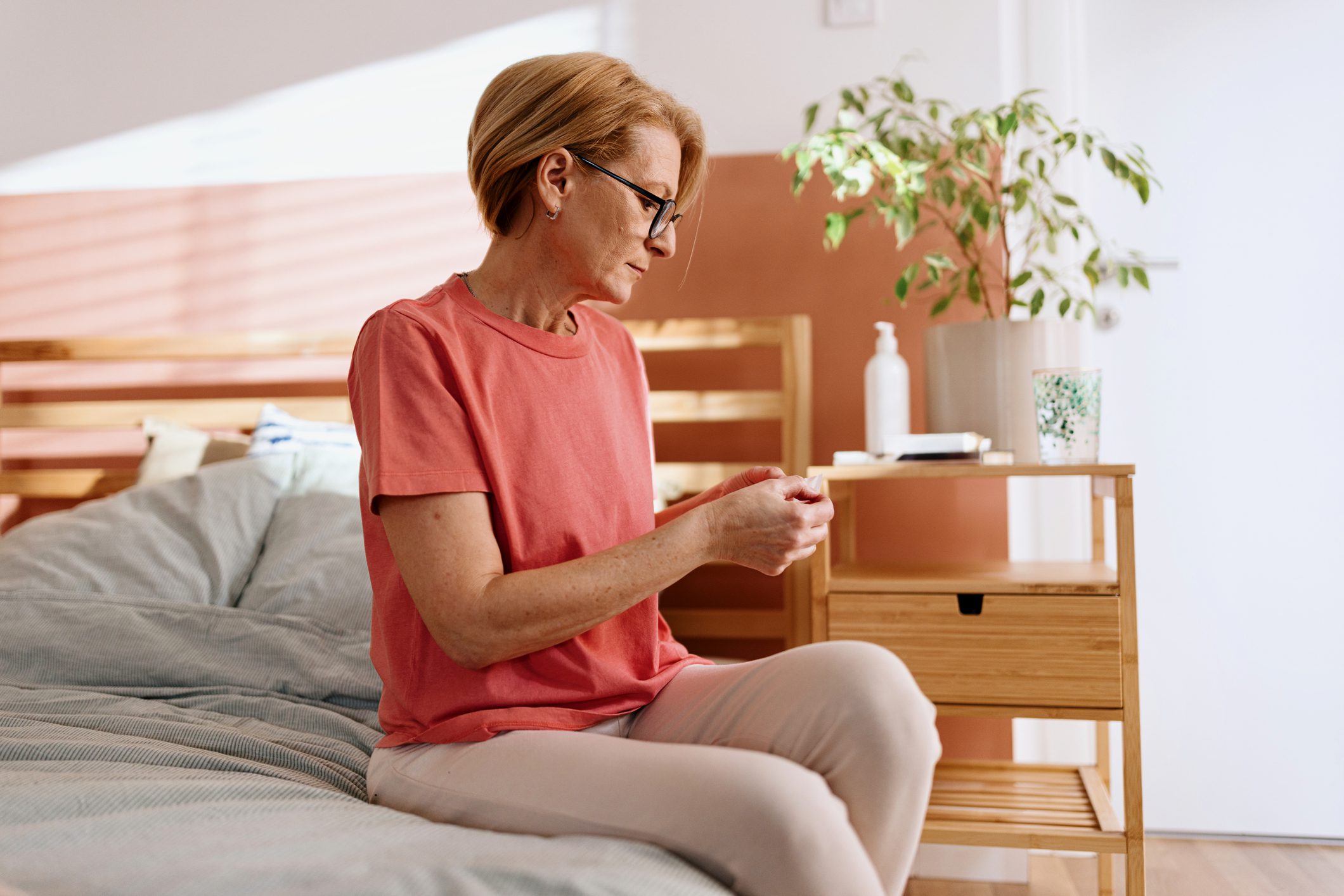Women are superheroes. We seamlessly switch capes between career and family and other obligations, but this superhero life can throw our hormones into a tailspin, causing everything from mood rollercoasters to sleepless nights—especially in perimenopause. When your hormones are off balance, you feel it in every part of your life.
Hormone replacement therapy, or HRT, can help alleviate that discomfort and improve your quality of life. But is it right for you?
With various forms of hormone therapy available, including bioidentical hormone replacement therapy, you'll want to consider the differences, benefits, and risks associated with these treatments.
Understanding Hormone Replacement Therapy
Hormone replacement therapy (HRT) is a treatment used to ease symptoms of hormone imbalances. It involves adding hormones, like estrogen, and sometimes progesterone or testosterone, to balance your body's hormone levels. Your doctor will choose the right hormones and doses for you based on your needs and treatment goals.1
Many women choose HRT during perimenopause and menopause. Hormonal changes during that transitional period can lead to a range of uncomfortable symptoms, including hot flashes, mood swings, sleep disturbances, and more.
However, there are other times you might also consider HRT to address hormonal imbalances.2,3 Among them include:
- Premature ovarian insufficiency (early menopause): To manage symptoms and maintain hormonal balance.
- Surgical removal of ovaries (oophorectomy, or “surgical menopause”): To replace lost hormones and alleviate symptoms.
- Hormonal imbalances related to polycystic ovary syndrome (PCOS): To regulate hormonal levels and improve symptoms.
- Low libido or sexual dysfunction: To enhance sexual well-being and desire.
- Osteoporosis prevention or treatment: To maintain bone density and reduce fracture risk.
- Managing symptoms of endometriosis or uterine fibroids: To alleviate pain and regulate menstrual cycles.
The Truth About Estrogen and Breast Cancer
HRT often involves estrogen, either alone or combined with other hormones like progesterone or testosterone. Estrogen replacement helps balance hormone levels and can significantly improve the quality of life if you’re experiencing symptoms from hormonal imbalances, like during menopause.
A common fear about HRT is that it increases the risk of breast cancer because of estrogen. Many women are afraid to use HRT thinking estrogen causes breast cancer. However, this is a misconception, and it's important to understand the overall benefits of HRT.
Estrogen plays a vital role in maintaining heart health and overall well-being. The breast-cancer myth stems from a 2002 study called the Women's Health Initiative (WHI), which suggested a link between HRT and breast cancer.4 Upon closer examination of the data over the last two decades, researchers discovered several misunderstandings about the study's conclusions.
The study involved women taking a specific form of estrogen derived from horses known as conjugated equine estrogen, or Premarin, along with a synthetic progestin for those who hadn't had a hysterectomy.
Researchers linked the synthetic progestin, not the estrogen itself, with an increased risk of breast cancer. The actual risk increase was less than 1%, or eight extra breast-cancer cases per 10,000 women on the treatment. This is much less alarming than initially thought.
Critics say the WHI study caused unnecessary and widespread fear and ultimately deprived many women of symptom relief during menopause. One of the flaws of the study was that the participants’ average age was 63, but most women begin HRT near the onset of menopause (typically between the ages of 45 and 55). This timing could have influenced the safety profile of the therapy.5
While the WHI study did raise concerns, later research gives a better view of estrogen therapy. Recent studies show that estrogen therapy, sometimes with progestin, can be beneficial for menopause symptoms and for bone and heart health when used correctly.6
Benefits of Hormone Replacement Therapy During Menopause
Practitioners use two main types of treatment during menopause: estrogen therapy, which involves taking estrogen alone and is suitable for women who have had a hysterectomy, and combination therapy, which combines estrogen with progestin. Doctors use combination therapy for women with an intact uterus to reduce the risk of uterine cancer.
Hormone replacement during menopause shows promise for several conditions, including:
- Menopausal symptoms: HRT can alleviate hot flashes, night sweats, vaginal dryness, and mood swings.7
- Bone support: HRT maintains bone density and reduces osteoporosis risk, especially in postmenopausal women.8
- Weight management: HRT can also help you manage weight gain that often accompanies menopause, improving your body composition.9
- Heart health: Observational studies show a 30-50% risk reduction for coronary heart disease among HRT users compared to non-users.10
- Sleep: HRT improves sleep by restoring hormonal balance, especially for those with sleep disturbances due to hot flashes or night sweats.11
Other Benefits of Hormone Replacement Therapy
HRT can address hormonal imbalances in various situations, which means you might also think about it beyond menopause when hormone-related issues arise. Among the other conditions HRT can support include:
- PMS: HRT can alleviate severe PMS symptoms like mood swings, bloating, and breast tenderness.12
- Menstrual irregularities: HRT, especially with progesterone, regulates menstrual cycles and reduces heavy bleeding.13
- Vaginal dryness: HRT, especially when administered vaginally, restores vaginal moisture and comfort during sex.14
- Cognitive function: Estrogen supports memory, creativity, and cognitive abilities. HRT may help maintain cognitive function and reduce age-related brain decline.15
- Energy: HRT restores hormonal balance, increasing energy and vitality.16
- Sleep quality: Hormones influence the sleep-wake cycle. Conversely, sleep quality can impact the production of hormones. HRT can improve sleep patterns and quality.17
- Mood stability: Estrogen and progesterone impact mood regulation, enhancing emotional well-being and reducing anxiety and irritability.18
HRT is not without risks, and you'll want to weigh the pros and cons carefully. Discuss potential risks and side effects with your healthcare provider, including the risk of blood clots, breast cancer, and stroke, especially in older women or those with specific health conditions.
The Role of Testosterone
While discussions surrounding HRT often revolve around estrogen and progesterone, testosterone complements these hormones by maintaining muscle mass, bone density, and sexual function. Adequate testosterone levels also support mood stability and emotional well-being, while low levels can contribute to depression and irritability.19,20
Integrating testosterone into HRT helps alleviate symptoms and promotes overall health during menopause.
Bioidentical Hormones vs. Synthetic Hormones
HRT can be of two types: traditional HRT and bioidentical hormone replacement therapy (BHRT).
Traditional HRT uses synthetic hormones, which are different from the hormones your body naturally produces. BHRT, on the other hand, uses hormones that are similar in structure to your body's natural hormones. This fundamental distinction is a crucial factor to consider when exploring HRT options, as it can significantly impact the effectiveness and safety of the treatment.
“Bioidentical” hormones are made to closely match the hormones your body makes naturally. You can get these through regular doctor prescriptions and pharmacies. Some special pharmacies can also tailor these hormones to suit individual needs, including specific doses and delivery methods. In contrast, synthetic hormones are artificial and do not precisely mimic your body's natural hormones.21,22
Do You Need HRT? What To Try First
One good thing that came out of the WHI trial was the exploration of alternative methods for managing menopausal symptoms. This prompted a conversation about non-hormonal interventions, including exercise, supplements, dietary changes, and other complementary therapies, ultimately fostering a more holistic approach to health.
I strongly recommend discussing HRT with your doctor as soon as you have symptoms of perimenopause, however, you may find that you don’t need it. Taking proactive steps to support your hormonal health can create impressive results:
- Eat protein first: Increasing your protein intake can provide the amino acids necessary for hormone production. Eating enough protein can help restore hormone balance, stabilize blood-sugar levels, and helping you reach your goal weight.23
- Start resistance training: Lifting heavy things can help you build muscle to maintain a healthy weight and promote the production of hormones that support metabolism and bone density.24
- Manage stress: Chronic stress can disrupt hormonal balance, including your stress hormone cortisol. Elevated cortisol levels can lead to other hormone imbalances, including insulin resistance, making it more difficult for cells to respond to insulin, which regulates blood-sugar levels.25 Mindfulness, meditation, deep breathing exercises, or other stress-management practices can help reduce cortisol levels and support hormone balance.
- Get better sleep: Sleep is essential for regulating many hormones, including growth hormone, testosterone, and insulin. Poor sleep can contribute to hormonal imbalances.26 Getting eight hours of uninterrupted sleep helps regulate hormones, supporting your body's natural hormone production and repair processes.
- Supplement: Specific nutrients and supplements, such as vitamin D and omega-3 fatty acids, can positively impact hormonal health.27 I've also found specific nutrients that help make the menopausal transition more manageable and help restore hormonal balance.
Work With a Functional-Medicine Doctor
My goal is to empower you to make informed health decisions and explore natural ways to support hormonal balance. If you experience discomfort or hormonal symptoms, consider hormone testing and seek help for lifestyle improvements.
I recommend talking with a functional-medicine doctor who takes a holistic approach. HRT is not one-size-fits-all. Before considering HRT, a healthcare professional should evaluate your entire history, including medical history, symptoms, and health.
I also encourage you to explore alternative therapies and lifestyle changes, as they may provide relief without hormone supplementation. But don't be discouraged to try HRT if you and your practitioner believe it's the right fit for your condition.
Detoxifying to Create Hormonal Balance
Detoxification can help restore hormone balance by aiding your body in eliminating toxins and substances that may disrupt hormonal function. By reducing the burden of toxins, your body can better regulate hormone production and utilization, improving your hormonal balance and overall well-being.
I designed the 10-Day Protein-Powered Detox Program to provide comprehensive detoxification support by addressing the biggest glitch in most plans: optimal protein. Providing these essential amino acids gives your body the nutrients to detoxify, manage hormonal imbalance, and sustain a healthy weight. This program includes everything you need (including a private, supportive Facebook group) to ease your toxic burden and prime your body to burn fat safely and sustainably.*
Learn more about the 10-Day Protein-Powered Detox Program here.
References:
- Harper-Harrison G, Shanahan MM. Hormone Replacement Therapy. [Updated 2023 Feb 20]. In: StatPearls [Internet]. Treasure Island (FL): StatPearls Publishing; 2023 Jan-. Available from: https://www.ncbi.nlm.nih.gov/books/NBK493191/
- Sullivan SD, Sarrel PM, Nelson LM. Hormone replacement therapy in young women with primary ovarian insufficiency and early menopause. Fertil Steril. 2016 Dec;106(7):1588-1599. doi: 10.1016/j.fertnstert.2016.09.046. PMID: 27912889; PMCID: PMC5137796.
- Hamoda H, Sharma A. Premature ovarian insufficiency, early menopause, and induced menopause. Best Pract Res Clin Endocrinol Metab. 2023 Sep 27:101823. doi: 10.1016/j.beem.2023.101823. Epub ahead of print. PMID: 37802711.
- Office on Women's Health: Largest women's health prevention study ever – Women's Health Initiative
- Langer RD, Hodis HN, Lobo RA, Allison MA. Hormone replacement therapy – where are we now? Climacteric. 2021 Feb;24(1):3-10. doi: 10.1080/13697137.2020.1851183. Epub 2021 Jan 6. PMID: 33403881.
- Chlebowski RT, Aragaki AK. The Women's Health Initiative randomized trials of menopausal hormone therapy and breast cancer: findings in context. Menopause. 2023 Apr 1;30(4):454-461. doi: 10.1097/GME.0000000000002154. Epub 2023 Jan 22. PMID: 36727752.
- Gambacciani M, Levancini M. Hormone replacement therapy and the prevention of postmenopausal osteoporosis. Prz Menopauzalny. 2014 Sep;13(4):213-20. doi: 10.5114/pm.2014.44996. Epub 2014 Sep 9. PMID: 26327857; PMCID: PMC4520366.
- Aubertin-Leheudre M, Goulet ED, Dionne IJ. Enhanced rate of resting energy expenditure in women using hormone-replacement therapy: preliminary results. J Aging Phys Act. 2008 Jan;16(1):53-60. doi: 10.1123/japa.16.1.53. PMID: 18212394.
- Coulter SA. Heart disease and hormones. Tex Heart Inst J. 2011;38(2):137-41. PMID: 21494520; PMCID: PMC3066827.
- Mayo Clinic: Hormone therapy: Is it right for you?
- balance menopause: PMS, PMDD and the menopause
- balance menopause: Heavy periods during the perimenopause
- Krause M, Wheeler TL 2nd, Snyder TE, Richter HE. Local Effects of Vaginally Administered Estrogen Therapy: A Review. J Pelvic Med Surg. 2009 May;15(3):105-114. doi: 10.1097/SPV.0b013e3181ab4804. PMID: 22229022; PMCID: PMC3252029.
- Compton J, van Amelsvoort T, Murphy D. HRT and its effect on normal ageing of the brain and dementia. Br J Clin Pharmacol. 2001 Dec;52(6):647-53. doi: 10.1046/j.0306-5251.2001.01492.x. PMID: 11736875; PMCID: PMC2014570.
- Studd J. Ten reasons to be happy about hormone replacement therapy: a guide for patients. Menopause Int. 2010 Mar;16(1):44-6. doi: 10.1258/mi.2010.010001. PMID: 20424287.
- Kim TW, Jeong JH, Hong SC. The impact of sleep and circadian disturbance on hormones and metabolism. Int J Endocrinol. 2015;2015:591729. doi: 10.1155/2015/591729. Epub 2015 Mar 11. PMID: 25861266; PMCID: PMC4377487.
- BodyLogicMD: Hormone Loss and Mood Swings
- Mohamad NV, Soelaiman IN, Chin KY. A concise review of testosterone and bone health. Clin Interv Aging. 2016 Sep 22;11:1317-1324. doi: 10.2147/CIA.S115472. PMID: 27703340; PMCID: PMC5036835.
- Scott A, Newson L. Should we be prescribing testosterone to perimenopausal and menopausal women? A guide to prescribing testosterone for women in primary care. Br J Gen Pract. 2020 Mar 26;70(693):203-204. doi: 10.3399/bjgp20X709265. PMID: 32217602; PMCID: PMC7098532.
- Cleveland Clinic: Bioidentical Hormones: Therapy, Uses, Safety & Side Effects
- Files JA, Ko MG, Pruthi S. Bioidentical hormone therapy. Mayo Clin Proc. 2011 Jul;86(7):673-80, quiz 680. doi: 10.4065/mcp.2010.0714. Epub 2011 Apr 29. PMID: 21531972; PMCID: PMC3127562.
- Lonnie M, Hooker E, Brunstrom JM, Corfe BM, Green MA, Watson AW, Williams EA, Stevenson EJ, Penson S, Johnstone AM. Protein for Life: Review of Optimal Protein Intake, Sustainable Dietary Sources and the Effect on Appetite in Ageing Adults. Nutrients. 2018 Mar 16;10(3):360. doi: 10.3390/nu10030360. PMID: 29547523; PMCID: PMC5872778.
- Jamka M, Mądry E, Bogdański P, Kryściak J, Mądry R, Lisowska A, Ismagulova E, Gotz-Więckowska A, Chudzicka-Strugała I, Amanzholkyzy A, Walkowiak J. The Effect of Endurance and Endurance-Strength Training on Bone Mineral Density and Content in Abdominally Obese Postmenopausal Women: A Randomized Trial. Healthcare (Basel). 2021 Aug 20;9(8):1074. doi: 10.3390/healthcare9081074. PMID: 34442211; PMCID: PMC8391265.
- Cleveland Clinic: Insulin Resistance: What It Is, Causes, Symptoms & Treatment
- eproult R, Van Cauter E. Role of sleep and sleep loss in hormonal release and metabolism. Endocr Dev. 2010;17:11-21. doi: 10.1159/000262524. Epub 2009 Nov 24. PMID: 19955752; PMCID: PMC3065172.
- Women's Health Network: Best supplements and vitamins to balance hormones
The views in this blog by JJ Virgin should never be used as a substitute for professional medical advice. Please work with a healthcare practitioner concerning any medical problem or concern. The information here is not intended to diagnose, treat, or prevent any disease or condition. Statements contained here have not been evaluated by the Food and Drug Administration.
*These statements have not been evaluated by the Food and Drug Administration. This product is not intended to diagnose, treat, cure, or prevent any disease.






